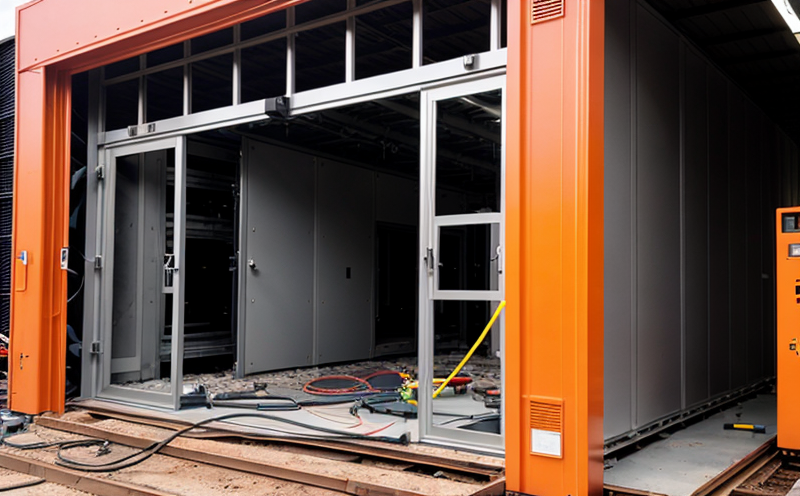ANSI C18.2M Thermal Safety Testing of Portable Secondary Batteries
The ANSI/IEEE Standard C18.2M-2019 for the Thermal Safety Testing of Portable Secondary Batteries is a critical benchmark in ensuring the safety and reliability of secondary batteries used in portable electronic devices, such as smartphones, laptops, and medical equipment.
This standard addresses the thermal stability of rechargeable batteries under various stress conditions to prevent thermal runaway events. It aims at reducing risks associated with overheating or explosion by conducting rigorous tests that simulate real-world scenarios where battery failure could occur.
The testing protocol outlined in ANSI C18.2M-2019 focuses on measuring the temperature rise, pressure buildup, and other indicators of potential thermal hazards during prolonged charging, overcharging, short-circuiting, and even after a simulated fire event. These tests are essential for manufacturers to ensure their products meet stringent safety requirements.
Our laboratory adheres strictly to this standard when performing thermal safety assessments on portable secondary batteries. Our team uses advanced instrumentation capable of simulating these conditions accurately and providing precise data points that help identify any vulnerabilities in the design or manufacturing process.
To begin with, we receive samples from clients which undergo rigorous preparation steps including cleaning, marking, and documentation according to industry best practices. The battery modules are then placed into controlled environments where they go through a series of pre-set test protocols designed specifically for ANSI C18.2M compliance.
Throughout the testing process, our highly skilled technicians monitor parameters such as internal resistance, voltage change rates, and heat generation levels continuously using state-of-the-art equipment like thermocouples, data loggers, and specialized software solutions provided by leading manufacturers in the field.
The results obtained from these tests are meticulously documented and analyzed to determine whether or not the battery meets all specified criteria laid out within ANSI C18.2M-2019. Compliance with this standard ensures that batteries do not pose a risk of fire, explosion, or other hazards during normal use.
By adhering strictly to ANSI C18.2M and leveraging our expertise in thermal safety testing, we can provide clients with reliable data that demonstrates their product's ability to withstand extreme conditions without compromising on quality or performance.
Scope and Methodology
The scope of ANSI/IEEE C18.2M covers the evaluation of portable secondary batteries' thermal stability during specified test conditions. This includes examining how well a battery can handle overcharging, short-circuiting, internal shorts, and even post-fire scenarios.
To achieve accurate results, our laboratory employs sophisticated equipment like differential scanning calorimeters (DSC), scanning electron microscopes (SEM), and gas chromatographs to measure various characteristics such as heat output, pressure changes inside the battery case, and chemical reactions within the cell.
A typical test sequence begins by charging a battery module until it reaches its maximum capacity. The battery is then subjected to different stress conditions for extended periods while being monitored closely. After each condition has been met, we record all relevant data points which are later analyzed against predefined thresholds set forth in ANSI C18.2M.
Following the completion of the prescribed tests, our experts review and interpret the collected information to draw conclusions about the battery's thermal behavior under various stress conditions. Based on these findings, recommendations may be made regarding design improvements or additional safety measures that could enhance overall performance while minimizing risks associated with thermal runaway events.
Quality and Reliability Assurance
The quality of our services is paramount in maintaining high standards across all aspects of battery testing. To ensure accurate results, we maintain strict adherence to ANSI C18.2M guidelines throughout every stage of the testing process—from sample preparation to analysis.
We invest heavily in top-tier equipment and regularly update our facilities to keep pace with technological advancements within the industry. Our trained personnel possess extensive knowledge and experience in conducting thermal safety assessments according to international standards like ISO 6358:2017 and IEC 62133-4.
Furthermore, we employ rigorous quality control measures during each test run to minimize human error or equipment malfunctions that could affect the accuracy of results. By doing so, we guarantee clients receive reliable data they can trust when making decisions about product design improvements or regulatory compliance.
Environmental and Sustainability Contributions
The pursuit of sustainability has become increasingly important in today's world, especially within industries that produce large quantities of electronic waste. By adhering to strict environmental policies during our testing procedures, we contribute positively towards reducing the ecological footprint left behind by our operations.
We follow environmentally friendly practices such as recycling used batteries responsibly after completing tests and disposing of hazardous materials properly through certified waste management companies. Additionally, we work closely with clients to explore ways in which they can incorporate more sustainable design principles into their products' development cycles.
Through continuous improvement initiatives focused on reducing energy consumption during testing processes and optimizing resource usage, our laboratory aims not only at delivering top-notch services but also at fostering a greener future for all stakeholders involved.





